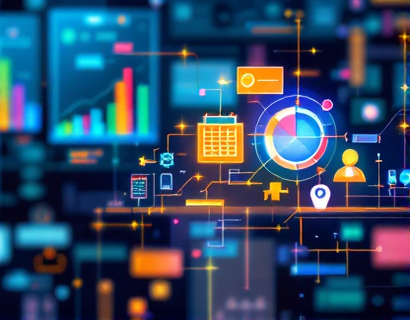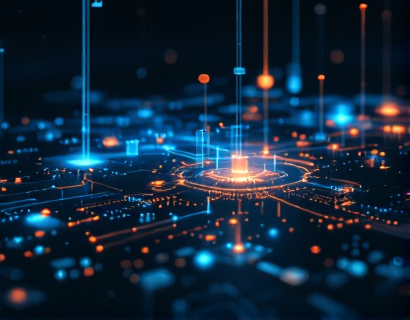Elevating Ucosystem Engagement through Crypto and AI Synergy
The intersection of cryptocurrency and artificial intelligence (AI) is creating unprecedented opportunities for enhancing user engagement and driving growth within the digital ecosystem. This article delves into the transformative potential of these technologies, offering a comprehensive guide on how to leverage their synergy for innovation and success in the digital age.
Understanding Cryptocurrency and AI
Cryptocurrency, a digital or virtual currency secured by cryptography, operates on a decentralized network known as blockchain. This technology ensures transparency, security, and immutability, making it an attractive solution for various applications beyond mere financial transactions. On the other hand, AI refers to the simulation of human intelligence processes by machines, particularly computer systems. These processes include learning, reasoning, and self-correction. When combined, cryptocurrency and AI can create powerful tools that enhance digital interactions and experiences.
The Power of Smart Contracts
One of the most significant innovations in the cryptocurrency space is the smart contract. A smart contract is a self-executing contract with the terms of the agreement directly written into code. These contracts automatically enforce and execute the terms when predefined conditions are met, eliminating the need for intermediaries. In the context of the digital ecosystem, smart contracts can automate and streamline various processes, from content monetization to user verification, thereby increasing efficiency and reducing costs.
AI-Driven Personalization in Ucosystems
AI's ability to analyze vast amounts of data and derive meaningful insights makes it an ideal partner for enhancing user engagement in digital ecosystems. By leveraging machine learning algorithms, platforms can offer highly personalized experiences tailored to individual user preferences and behaviors. For instance, AI can recommend content, products, or services based on a user's past interactions, significantly improving satisfaction and retention rates. This level of personalization not only enhances user experience but also fosters deeper engagement with the ecosystem.
Enhancing Security with AI
Security is a paramount concern in the digital ecosystem, especially with the increasing sophistication of cyber threats. AI plays a crucial role in bolstering security measures by detecting and mitigating threats in real-time. Machine learning models can identify unusual patterns and anomalies that may indicate a security breach, allowing for prompt action to be taken. Additionally, AI can enhance the security of cryptocurrency transactions through advanced fraud detection systems, ensuring that users' assets are protected. This dual benefit of enhanced security and user trust is invaluable for building a robust and reliable digital ecosystem.
Decentralized Finance (DeFi) and AI
Decentralized Finance (DeFi) is a rapidly growing sector that leverages blockchain technology to create financial services without traditional intermediaries. AI can significantly enhance DeFi platforms by optimizing trading strategies, risk management, and portfolio management. For example, AI algorithms can analyze market data and predict price movements, helping users make informed investment decisions. Moreover, AI can automate complex financial tasks, such as arbitrage and liquidity provision, making DeFi more accessible and efficient. This integration not only improves user experience but also opens up new opportunities for growth and innovation in the financial space.
Ucosystem Engagement through Gamification
Gamification, the application of game-design elements in non-game contexts, can be a powerful tool for increasing user engagement in digital ecosystems. When combined with AI and cryptocurrency, gamification can create immersive and rewarding experiences. AI can personalize gamified elements to individual user preferences, ensuring that the experience is both engaging and meaningful. For instance, users can earn cryptocurrency tokens for completing tasks or achieving milestones, which can be used within the ecosystem or exchanged for real-world value. This approach not only boosts engagement but also incentivizes users to actively participate and contribute to the ecosystem.
Predictive Analytics and User Behavior
AI-driven predictive analytics can provide deep insights into user behavior, helping platform developers and managers make data-driven decisions. By analyzing historical data and identifying trends, AI can predict future user actions and preferences. This foresight allows for proactive measures to be taken, such as enhancing features that users are likely to engage with or addressing potential issues before they arise. In the context of a digital ecosystem, this level of insight can lead to more effective content curation, targeted marketing, and overall user satisfaction.
Tokenization of Assets and Services
Tokenization, the process of converting rights to an asset into a token on a blockchain, is another area where cryptocurrency and AI can synergize to enhance the digital ecosystem. By tokenizing assets and services, platforms can create fractional ownership models, making high-value assets accessible to a broader audience. AI can optimize the tokenization process by analyzing market conditions, user behavior, and other relevant factors to determine the optimal timing and pricing for token launches. This combination not only increases liquidity and accessibility but also drives user engagement and participation in the ecosystem.
Challenges and Considerations
While the integration of cryptocurrency and AI offers numerous benefits, it also presents several challenges that must be addressed. Regulatory compliance is a significant concern, as the legal landscape for cryptocurrencies and AI is still evolving. Platforms must navigate varying regulations across jurisdictions to ensure compliance and avoid legal pitfalls. Additionally, the technical complexity of these technologies requires a skilled workforce capable of developing, maintaining, and innovating within this space. Education and training programs are essential to build a competent team that can harness the full potential of crypto and AI.
Future Trends and Opportunities
The future of the digital ecosystem is bright, with ongoing advancements in both cryptocurrency and AI promising even more innovative applications. One emerging trend is the integration of blockchain with edge computing, which can further enhance the performance and efficiency of AI-driven services. By processing data closer to the source, edge computing reduces latency and improves response times, making real-time AI applications more feasible. Another area of interest is the development of decentralized AI models, where AI algorithms are trained and run on a distributed network, ensuring greater privacy and security.
Moreover, the rise of Web3, a decentralized internet powered by blockchain technology, presents a new frontier for combining cryptocurrency and AI. Web3 aims to give users more control over their data and online identities, with AI playing a crucial role in managing and securing these digital assets. The synergy between these technologies can lead to a more equitable and user-centric digital ecosystem, where individuals benefit from the full potential of their data and digital identities.
In conclusion, the convergence of cryptocurrency and AI is revolutionizing the digital ecosystem, offering unprecedented opportunities for innovation and growth. By leveraging smart contracts, AI-driven personalization, enhanced security, DeFi, gamification, predictive analytics, and tokenization, platforms can create engaging and value-driven experiences for users. While challenges exist, the potential rewards make this an exciting and promising area to explore. As the technology continues to evolve, those who embrace and master the integration of crypto and AI will be well-positioned to lead the next wave of digital transformation.











































